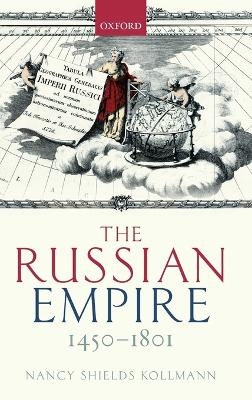
The Russian Empire 1450-1801
Seiten
2017
Oxford University Press (Verlag)
978-0-19-928051-3 (ISBN)
Oxford University Press (Verlag)
978-0-19-928051-3 (ISBN)
Russia's imperial past has shaped modern Russian identity and historical experience. The Russian Empire 1450-1801 surveys the empire's emergence and governance, exploring how the state maintained control of defense, criminal law, taxation, and mobilization of resources, while tolerating local religions, languages, cultures, and institutions.
Modern Russian identity and historical experience has been largely shaped by Russia's imperial past: an empire that was founded in the early modern era and endures in large part today. The Russian Empire 1450-1801 surveys how the areas that made up the empire were conquered and how they were governed. It considers the Russian empire a 'Eurasian empire', characterized by a 'politics of difference': the rulers and their elites at the center defined the state's needs minimally - with control over defense, criminal law, taxation, and mobilization of resources - and otherwise tolerated local religions, languages, cultures, elites, and institutions. The center related to communities and religions vertically, according each a modicum of rights and autonomies, but didn't allow horizontal connections across nobilities, townsmen, or other groups potentially with common interests to coalesce. Thus, the Russian empire was multi-ethnic and multi-religious; Nancy Kollmann gives detailed attention to the major ethnic and religious groups, and surveys the government's strategies of governance - centralized bureaucracy, military reform, and a changed judicial system. The volume pays particular attention to the dissemination of a supranational ideology of political legitimacy in a variety of media - written sources and primarily public ritual, painting, and particularly architecture. Beginning with foundational features, such as geography, climate, demography, and geopolitical situation, The Russian Empire 1450-1801 explores the empire's primarily agrarian economy, serfdom, towns and trade, as well as the many religious groups - primarily Orthodoxy, Islam, and Buddhism. It tracks the emergence of an 'Imperial nobility' and a national self-consciousness that was, by the end of the eighteenth century, distinctly imperial, embracing the diversity of the empire's many peoples and cultures.
Modern Russian identity and historical experience has been largely shaped by Russia's imperial past: an empire that was founded in the early modern era and endures in large part today. The Russian Empire 1450-1801 surveys how the areas that made up the empire were conquered and how they were governed. It considers the Russian empire a 'Eurasian empire', characterized by a 'politics of difference': the rulers and their elites at the center defined the state's needs minimally - with control over defense, criminal law, taxation, and mobilization of resources - and otherwise tolerated local religions, languages, cultures, elites, and institutions. The center related to communities and religions vertically, according each a modicum of rights and autonomies, but didn't allow horizontal connections across nobilities, townsmen, or other groups potentially with common interests to coalesce. Thus, the Russian empire was multi-ethnic and multi-religious; Nancy Kollmann gives detailed attention to the major ethnic and religious groups, and surveys the government's strategies of governance - centralized bureaucracy, military reform, and a changed judicial system. The volume pays particular attention to the dissemination of a supranational ideology of political legitimacy in a variety of media - written sources and primarily public ritual, painting, and particularly architecture. Beginning with foundational features, such as geography, climate, demography, and geopolitical situation, The Russian Empire 1450-1801 explores the empire's primarily agrarian economy, serfdom, towns and trade, as well as the many religious groups - primarily Orthodoxy, Islam, and Buddhism. It tracks the emergence of an 'Imperial nobility' and a national self-consciousness that was, by the end of the eighteenth century, distinctly imperial, embracing the diversity of the empire's many peoples and cultures.
Nancy Kollmann has taught early modern Russian history at Stanford University since 1982. Her research has focused on the problem of how politics worked in an autocratic state; she has studied how the great men of the Moscow court received and enhanced their political positions through marriage and kinship, how the tsar's government supported litigations over personal honor for all social groups as a means of social integration and how criminal law was applied in practice. She has also focused on the image of Russia conveyed to Europeans in contemporary engravings, maps, and books.
PART I: ASSEMBLING THE EMPIRE; PART II: THE MUSCOVITE EMPIRE THROUGH THE SEVENTEENTH CENTURY; PART III: THE CENTURY OF EMPIRE: RUSSIA IN THE EIGHTEENTH CENTURY
| Erscheinungsdatum | 19.01.2017 |
|---|---|
| Reihe/Serie | Oxford History of Early Modern Europe |
| Zusatzinfo | over 50 black and white images and maps |
| Verlagsort | Oxford |
| Sprache | englisch |
| Maße | 162 x 241 mm |
| Gewicht | 966 g |
| Themenwelt | Geschichte ► Allgemeine Geschichte ► Neuzeit (bis 1918) |
| Geisteswissenschaften ► Geschichte ► Regional- / Ländergeschichte | |
| Geschichte ► Teilgebiete der Geschichte ► Kulturgeschichte | |
| Geschichte ► Teilgebiete der Geschichte ► Religionsgeschichte | |
| Geschichte ► Teilgebiete der Geschichte ► Wirtschaftsgeschichte | |
| Sozialwissenschaften ► Politik / Verwaltung ► Staat / Verwaltung | |
| ISBN-10 | 0-19-928051-7 / 0199280517 |
| ISBN-13 | 978-0-19-928051-3 / 9780199280513 |
| Zustand | Neuware |
| Haben Sie eine Frage zum Produkt? |
Mehr entdecken
aus dem Bereich
aus dem Bereich
Europa 1848/49 und der Kampf für eine neue Welt
Buch | Hardcover (2023)
DVA (Verlag)
48,00 €
Giordano Bruno - ein ketzerisches Leben
Buch | Hardcover (2024)
C.H.Beck (Verlag)
29,90 €
Kunst und Gesellschaft an der Schwelle zur globalen Welt
Buch | Hardcover (2024)
Klett-Cotta (Verlag)
42,00 €


